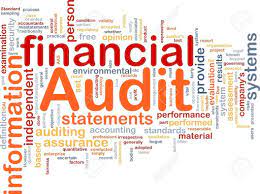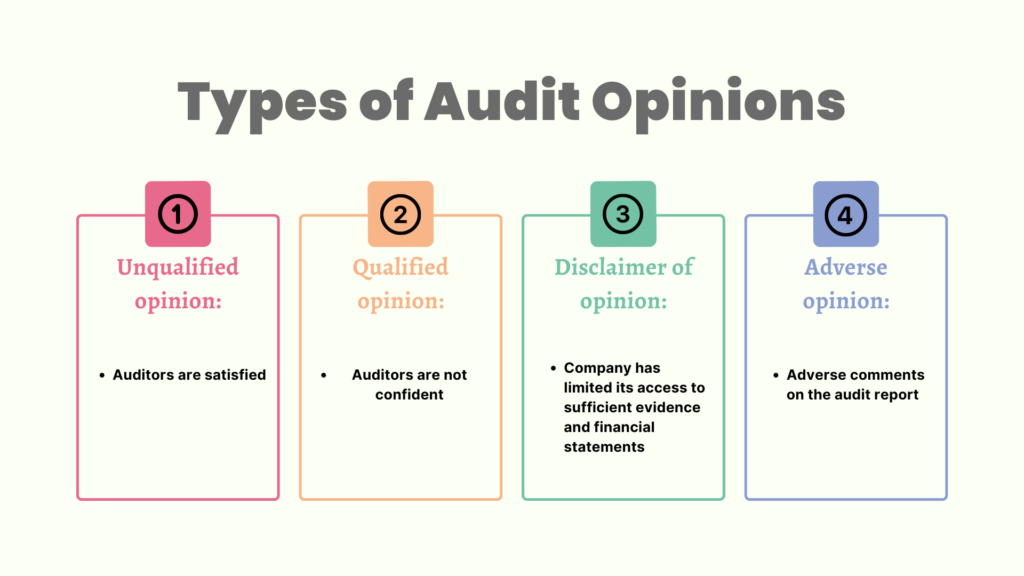Businesses produce financial statements (i.e., income statement, balance sheet, cash flow statement, etc.) to provide information about their financial performance to stakeholders, such as investors, employees, banks, regulatory bodies, and so on.A financial audit is a thorough, detailed examination of a company’s financial statements and accounts. A dispassionate third-party auditor conducts the audit and develops an audit opinion based on the most recent financial statements. This information helps guide decision-making and controls. But how can you ensure the accuracy of these financial statements? Financial audits conducted by a qualified third-party (an auditor) can enhance confidence in your business’s financial statements and identify areas where your accounting processes could be improved

Why is an audit of financial statements necessary?
- To ensure the accuracy of the books and financial statements
- For regulatory compliance with state or federal financial laws
- To demonstrate accurate financial statements for lenders or investors
- To improve the company’s internal controls and accounting processes
- Although an audit of your financial statements may make you feel like you’re under the spotlight, the process is intended to assure your stakeholders that management has provided a “true and fair” view of the business’s financial position. This confirms that your company’s financial processes are all above board – minimizing the risk of fraud – and that your accounting documents aren’t covering up for any financial mismanagement. However, it’s also important to note that financial statement audits can bring value to your business by identifying controls or processes that could be improved, thereby enhancing the quality of your business.
What’s the difference between accounting and auditing?
Accounting is the regular financial reporting and activity that helps record and maintain a company’s financial life. Accounting follows a strict set of standards (called the Generally Accepted Accounting Principles, or GAAP) to maintain confidence in the financial statements a company compiles.
Auditing is another less frequent activity to ensure that your accounting policies are sufficient and error-free. Its purpose is to obtain an independent opinion on the company’s financial statements. Many internal and external stakeholders require occasional audits to verify financial data. Plus, the company benefits from this regular maintenance of its processes and records.
What is reviewed during a financial audit?
A financial audit considers every aspect of your financial process and documentation. During a typical audit, expect your auditor to review several pieces of financial information to render an independent opinion.
- Account balances and transactions: Documentation of the account balances and transaction history for each account covering the duration of the review period
- Historical documents: Documents about the company’s founding, such as articles of incorporation and bylaws
- IRS documentation: IRS communications and documents, such as exemption letters and returns
- Internal documents: Policies and procedures documentation, such as financial reporting processes, personnel handbooks, accounting procedures, and security documents
- Commitments: Financial commitments, such as loans, lease agreements, employee benefits, and other liabilities the company must pay
- Financial Statements: Previous cash flow statements, balance sheets, and income statements that provide context for the other financial reporting activities within the organization
Benefits of a financial audit
- Error detection: An audit identifies the financial accuracy of the books by comparing known financial data (like previous year totals, trial balance, and other sources of verified data) to identify discrepancies and issues. The error detection process may surface unusual data or trends.
- Fraud deterrent: During the audit, your auditor may review internal controls, such as the segregation of duties and dual control. They may look for changes in accounting estimates or incorrect requests for payment. A forensic audit addresses the possibility of fraud and analyzes data and trends to uncover potential malfeasance.
- Cost reduction: Audits take an in-depth look at the organization’s financial performance. They help identify areas for improvement, streamlining, and cost-cutting.
- Resource allocation: A financial audit helps leaders decide how to spend available capital. It may reveal areas of over- or under-spending that help align allocation with organizational goals.
- External reporting: Investors and lending institutions need assurances that the company has good financial management practices. The reporting from a financial audit helps companies demonstrate their financial process and ability to repay.

Preparing for a financial audit
Preparing for an audit takes time and attention, but with advanced preparation, it can be a smooth and informative process. Begin your audit planning with these three basic steps to reduce friction during the research and reporting process.
Locate pertinent financial information: Collect all documents for the review period of the audit. Include trial balance info, the general ledger, the book of accounts, financial statements, IRS documents, and supporting documents for your accounting.
Collect internal documentation: Pull together internal documents or process guidelines such as handbooks, accounting standards of practice (SOPs), department manuals, and bylaws.
Communicate to internal and external stakeholders: Discuss relevant information and dates with external auditors, the finance team, accounting team members, and others to create transparency and cooperation in the audit process. Communicate issues or discrepancies in advance so they can be addressed and resolved early.
FAQs
Q: Why is a financial audit necessary?
Financial audits provide assurance to stakeholders, such as investors, creditors, and regulators, that the financial statements are reliable and accurately represent the financial position of the entity.
Q: What is the role of auditors in a financial audit?
Auditors examine financial records, conduct tests, and assess internal controls to form an opinion on the accuracy and reliability of the financial statements. They may also provide recommendations for improvement.
Q: How long does a financial audit process take?
The duration of a financial audit varies depending on the size and complexity of the organization, the scope of the audit, and other factors
Q: What happens if a company fails a financial audit?
f significant issues are identified during a financial audit, the auditors may issue a qualified or adverse opinion. This could lead to consequences such as regulatory scrutiny, reputational damage, or financial penalties.
Practice area's of B K Goyal & Co LLP
Income Tax Return Filing | Income Tax Appeal | Income Tax Notice | GST Registration | GST Return Filing | FSSAI Registration | Company Registration | Company Audit | Company Annual Compliance | Income Tax Audit | Nidhi Company Registration| LLP Registration | Accounting in India | NGO Registration | NGO Audit | ESG | BRSR | Private Security Agency | Udyam Registration | Trademark Registration | Copyright Registration | Patent Registration | Import Export Code | Forensic Accounting and Fraud Detection | Section 8 Company | Foreign Company | 80G and 12A Certificate | FCRA Registration |DGGI Cases | Scrutiny Cases | Income Escapement Cases | Search & Seizure | CIT Appeal | ITAT Appeal | Auditors | Internal Audit | Financial Audit | Process Audit | IEC Code | CA Certification | Income Tax Penalty Notice u/s 271(1)(c) | Income Tax Notice u/s 142(1) | Income Tax Notice u/s 144 |Income Tax Notice u/s 148 | Income Tax Demand Notice
Company Registration Services in major cities of India
Company Registration in Jaipur | Company Registration in Delhi | Company Registration in Pune | Company Registration in Hyderabad | Company Registration in Bangalore | Company Registration in Chennai | Company Registration in Kolkata | Company Registration in Mumbai | Company Registration in India | Company Registration in Gurgaon